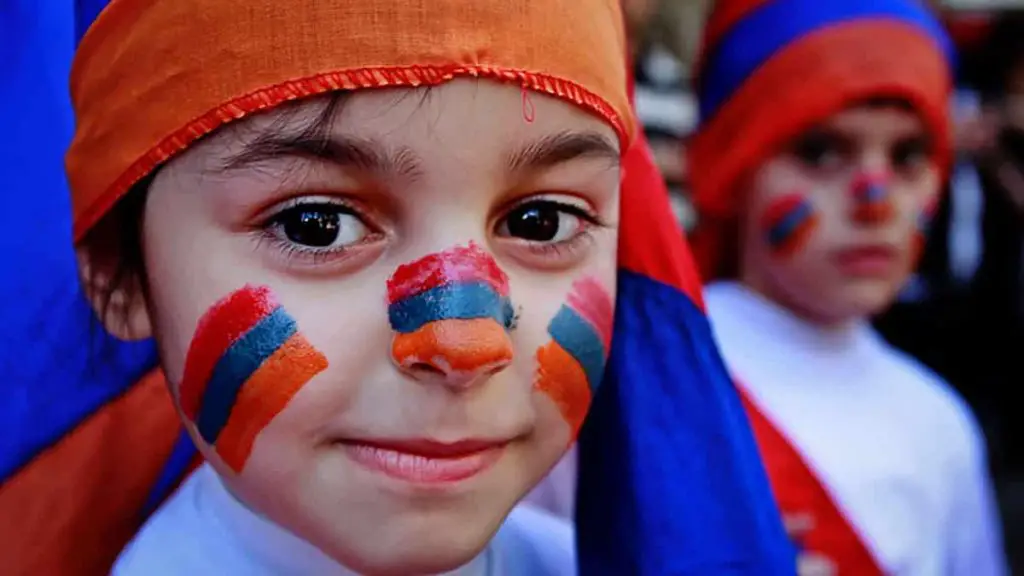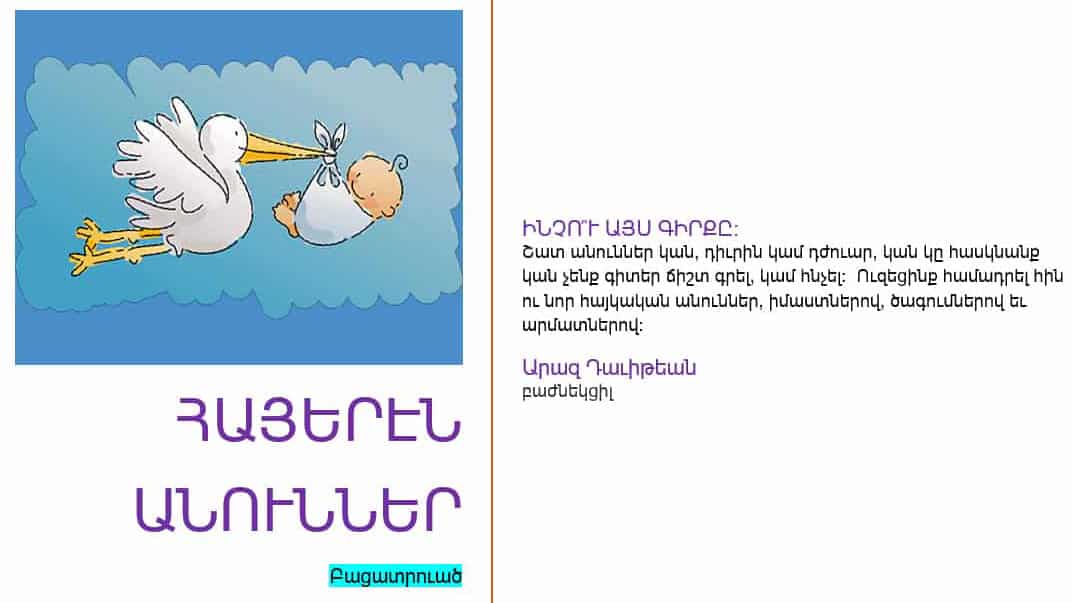To get to know the meanings of the Armenian names better, we can start from the name Armenia. Aram and Armen are the first basic names that gave us the name Armenian.
The country name of “Armenia” or “Armani” is mentioned, for the first time, in the ancient cuneiform inscriptions of Akkadian kings Sargon and Naramsin (3rd millennium BC). Persian King Darius also mentions the “Armina” or “Arminia” Crown in his inscriptions. There are also references for The Urartu Kingdom.
Research
A number of Armenian and foreign scholars have researched the etymology or origins of the Armenian people’s name “Armen”, but no one has yet given a definitive solution. Here are some examples of etymology.
The first part of the Armenian male name Armen means “brave, strong”, and the second part means “man”. The word man is not preserved in Armenian, but it is preserved in the word “manoog-little man”. So Armen means “strong man”. Some do not accept this etymology, considering that in fact the word “ari” was derived from a word (“man, energy”). The “man” or “men” syllable is not related to the “manoog” but comes from “uhn” pronunciation of the letter “N”. So they consider the word “armad=root” be first syllable as in “arm(ad)”+ “uhn” as parts of ARMAN; as in “zarm”= “Z”+”ARM” meaning “tribe, generation”.
Etymologists believe that the name Armen is originated from the name of the first Urartian king Arame.

Opinions are divided into two: some consider “arm” radical, others dissect the “Ar”. For example, it is argued that “Aram” consists of two words: “Ar” and “am”, where “Am” or “Ama” is the Mother Goddess, and “Ar” is the sun, the eye of heaven, by which “Ar” means “the eye of the Mother of God”.
Some experts say that “Aram” comes from the words “Ar”+”Arm”=”Ararm”. Ar as a variant of “Ayr”=(man). It means “strong, brave man” and also “Armenian”. Arm is also a native Armenian word meaning “generation, relatives, root”. “Ararm” has meant “strong man” or “generation of Armenians”. Subsequently, the “R” of “Ararm” fell and “Ararm” became “Aram”.
Some think that the names Armen and Aram came from the name of the great god Ara of Armenians. Plato testified that Er (Eros, that is, Ara) was the son of Armenios. The pagan gods of many ancient cultures later descended into humans and their names became personalized, so it is understandable why Er (Ara) was considered the son of Armenios.
Let’s add that Ara was the son of the patriarch Aram, famous for his marvelous beauty (Ara The Beautiful= Ara Keghetsig). And Aram comes from the name Arame, the famous King of Urartians (Armenians). According to Hratchia Ajarian, Armen is the short form of Armenak, who was the son of the patriarch Hayk and replaced him. In general, we can say that the name Armenia that unites the ancient people and tribes of Asia, comes from the name Ar or Ara, the ancient chief God of these tribes.
Based on a number of facts, Martiros Gavugchyan concludes that Ar-ma-ni is a complex word whose first Ar component is Ar, the very national god of the Armenians, the Ma component in Sumerian means “to give birth, to procreate”. Ar-ma means “Aradzin=giving birth to men, Ari=brave descendants, Arordi= sons of brave men”, and the ending is plural. Therefore, Armani means “Aradzinner=, Arordiner, SunChild”.
As we can see, opinions still clash, and they are contradictory. Whatever it is, one thing is clear. The Armenian names Aram, Armen, Armenak, Arame, Argishti, Ararat, Aragats come from immemorial times when the ancient gods had not left Armenia yet.
Historical
If we take a glimpse at our history we will see that Armenians were freedom-loving people starting with our forefather Haig, who escaped the arrogant ruling of Tyranid Bel, king of Babylon. He chose a wonderful land of thousands of rivers, wild mountains, and vast fields where he settled down with his entire household of about 300. Haig was assertive and brave and won the battle against Bel near Lake Van where he built his own village Haigashen. Armenian people are loyal to history, adore their lands and mountains, and show a huge amount of respect to the elderly and family members, their gods, and God after becoming Christians and Mother Nature as well. All these are partly revealed in the names Armenians choose to name their children after.
Nayiri is the old name of Armenia, Ararat the mountain, Arax, Arpi, Aris, Iris are names of Armenian Historical rivers, Van, Moush, Ani, Garine are names of Armenian cities.
Kings Queens and Ladies Names
Some of our names have Greek, Latin, or Persian roots due to long years of neighboring and mixed marriages between the royal families. Royal names are used today again showing how Armenians respect their kings and princes, such as Arshag, Vramshabouh, Aram, Dikran, Drtad, Khosrov, etc.
Armenian men respected women, their mothers, grandmothers, and wives, even had goddess Nane for motherhood who was the head of their household. Unlike other cultures, Armenian men generally respected the females and were proud of them and added the particle “tousder” or “toukhd” or “anoush” to their own names to show she was their daughter or sister. Dzaghig, Vart, Hasmig, Shoushan, Pardi for flowers, trees, and nature are mostly Feminine names.
Cultural Figures
Nowadays many choose Armenian names based on those of their parents or relatives, others of saints, in addition to a big segment who choose from among a long list of heroes of history and art. Our Culture is rich and we are lucky to have had talented and dedicated poets, writers, heroes, priests, and monks who have preserved and passed the stories of bravery of our long lost heroes through books of songs, poetry, and different artistic and historical material and we still honor and remember them like Vartan, Komitas, Pegor, Aram, Karekin, Vazken, etc. Ari(for brave), Nazeli (delicate), Siroun(beautiful) are Names that describe character. Other commonly used names are Azad (meaning freedom), Araz(River), Haygo etc., that are Gender-neutral Armenian names.
Religious Armenian Names
Armenian gods names
Ever since the beginning people showed respect to the Forefather and his family, soon Haig’s children became gods and later their names became the names of months, each dedicated to a god. Sometimes we meet people with their names such as Aramazt, Anahid, Masis, Vahakn, and Varak.
Biblical Names
Later on, after becoming Christians, we see biblical names sometimes used with another name indicating where the person proudly came from, for instance, Moses of Khoren, Hagop of Mdzpin, etc. Biblical names like Hagop, Hapet, Yessayi, Mariam, Yeghisapet, Marta, Manuel, Kapriel, Taniel, Mikayel. Christian names like Abaven, Khatchadour, Asdvadzadour, Hampartsoum, and Haroutiun, that are related to God and Christianity.
Famous Armenians
We have gathered a bouquet of names with their most probable definitions to offer whoever is interested in the information to enjoy and why not choose from or recommend for our new generation babies. And we do appreciate any additions or corrections. When you meet Armenian celebrities, don’t be surprised to hear foreign names like Youri Djorkaeff, Kim Kardashian, Cher, Charles Aznavour, Serj Tankian, Eric Nazarian, or Catherine Sarafian. They might have foreign names but they are inspired by other cultures and show how Armenians accept and respect fellow humans and their cultures.
If you like this article about Armenian names and would like to be updated when we publish a new one, please follow us on Aypoupen Instagram, and like our Aypoupen Facebook page and subscribe to our Aypoupen Youtube channel.


How is Aiki pronounced? I’ve been looking everywhere but can’t find a pronunciation. Is it like i-kee?
Yes Dear, its like “Eye- Key” or I and kee or key